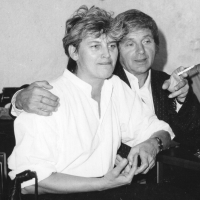Ethel, paint! When I’m released from the communist camp, we’ll exhibit together
Download image
Etela Laňková was born on 15 November 1943 in Diósgyőr, Hungary, near Miskolc (Miskolc). Her family emigrated there from Mukačevo, Ukraine. After the war, Michal Kristofori, Etela Laňková’s father, accepted the offer of the Czechoslovak authorities to settle the Czech borderlands after the expulsion of the Sudeten Germans. The family then moved to Prunéřov to find work, where Michal Kristofori tore up his party identification and resigned from the Communist Party of Czechoslovakia (KSČ) in protest against the inadequate housing conditions. Etela Laňková’s brother, the artist Jan Kristofori, became involved in the production and distribution of anti-communist leaflets, which he put up with friends in Semily. In a political trial in 1952, he was sentenced to ten years in prison; his sentence was subsequently reduced to seven years. He was imprisoned in a penal camp in Jáchymov and later in Bory. The family bore the arrest and imprisonment of their brother severely. The father tried in vain to find a lawyer who could obtain a lighter sentence. The family visited the brother in the camp and in prison, along with little Ethel. Then in the 1960s, the brother emigrated to Norway. Etela Laňková graduated from the gymnasium in Kadaň and later moved to Cheb, where she studied at the kindergarten pedagogical school. She worked in the cultural and social centre and organised cultural events. In 1962 she married and raised two daughters. She taught in a kindergarten in Kadaň and studied puppetry. In the 1970s, she visited her brother in Norway for the first time, bringing back press materials and musical recordings, such as Jaroslav Hutka’s albums. Norwegian friends offered her to stay in emigration, but she refused because of her daughters. In November 1989, she became involved in the revolution and became one of the first members of the Civic Forum in Cheb. She met many personalities of that time, including Václav Havel, Miloš Zeman and Václav Klaus. She was also involved in organising cultural events such as the Karel Kryl concert in Cheb and the Jazz Jam jazz festival. She devoted herself to painting and after the revolution she exhibited together with her brother. Later, Etela became the head of the Department of Education, Culture and Sports at the Cheb Town Hall and also worked in the gallery. She taught art at the Na Skalce primary school and opened her own studio. In 2022 she was still living in Cheb and continued her artistic activities.
